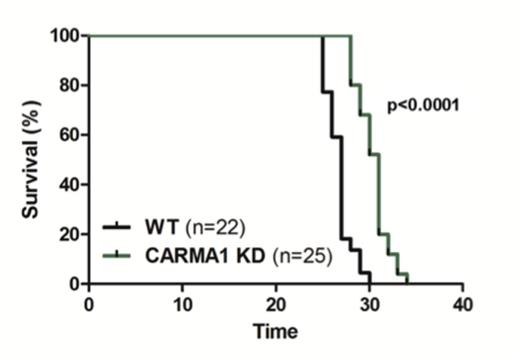Abstract
Acute lymphoblastic leukemia (ALL) is one of the most common childhood cancer, and can arise from the T or B cell lineage (T-ALL or B-ALL respectively). T-ALL patients have almost 80% cure rate, however leukemic cell migration to the central nervous system (CNS) remains a major therapeutic challenge. Little is known about potential regulators of T-ALL cell migration to the CNS, and identifying new molecules that can drive T-ALL to the CNS may provide new targets for drug therapy to specifically block T-ALL CNS infiltration. Recently it has been shown that a chemokine receptor CCR7 is an essential regulator of T-ALL cell infiltration into the CNS. CCR7 is a homeostatic chemokine receptor expressed on T cells that controls the homing of cells to lymph nodes, including na•ve T cells, dendritic cells, and lymphoma cells. Aberrant CCR7 expression has also been associated with migration of gastric, breast and head and neck cancers. We recently identified the molecule CARMA1 as a signaling mediator that acts downstream of CCR7.
We now find that CARMA1 regulates CNS migration in T-ALL. We have established a xenograft model of T-ALL, where we can assess the engraftment of a T-ALL cell line into the NOD/SCID/IL2Rγ2 immunodeficient mice. Using luciferase expressing T-ALL cells lacking CARMA1, we imaged tumor load using the IVIS imaging system. Animals receiving T-ALL cells lacking CARMA1 show a significant delay in the timing of leukemia development as well as longer overall survival compared to animals receiving wild type T-ALL cells (n=25, P value < 0.0001). In addition, animals injected with CARMA1-knockdown T-ALL cells have lower tumor burden in the brain. In some cases, no tumor cells were found in the brains of animals receiving CARMA1-knockdown T-ALL cells. Using immunohistochemistry and flow cytometry, we also find lower tumor burden in liver and spleen of mice injected with CARMA1-knockdown T-ALL cells compared to WT cells. We confirmed the role of CARMA1 in a NOTCH1ΔE-induced T-ALL animal model. Similar to the xenograft model, we find that mice receiving CARMA1KO-Notch1ΔE survived longer than mice receiving with WT- Notch1ΔE. These results demonstrate for the first time that CARMA1 may play an important role in T-ALL induction and leukemic cell migration to the CNS.
Numerous studies have demonstrated the importance of CARMA1 in normal T cell function. We now find that CARMA1 is also involved in controlling the migration of T-ALL cells to the CNS as well as survival of animals with T-ALL. These results suggest that CARMA1 may provide a novel therapeutic target in T-ALL.
No relevant conflicts of interest to declare.
Author notes
Asterisk with author names denotes non-ASH members.


This feature is available to Subscribers Only
Sign In or Create an Account Close Modal